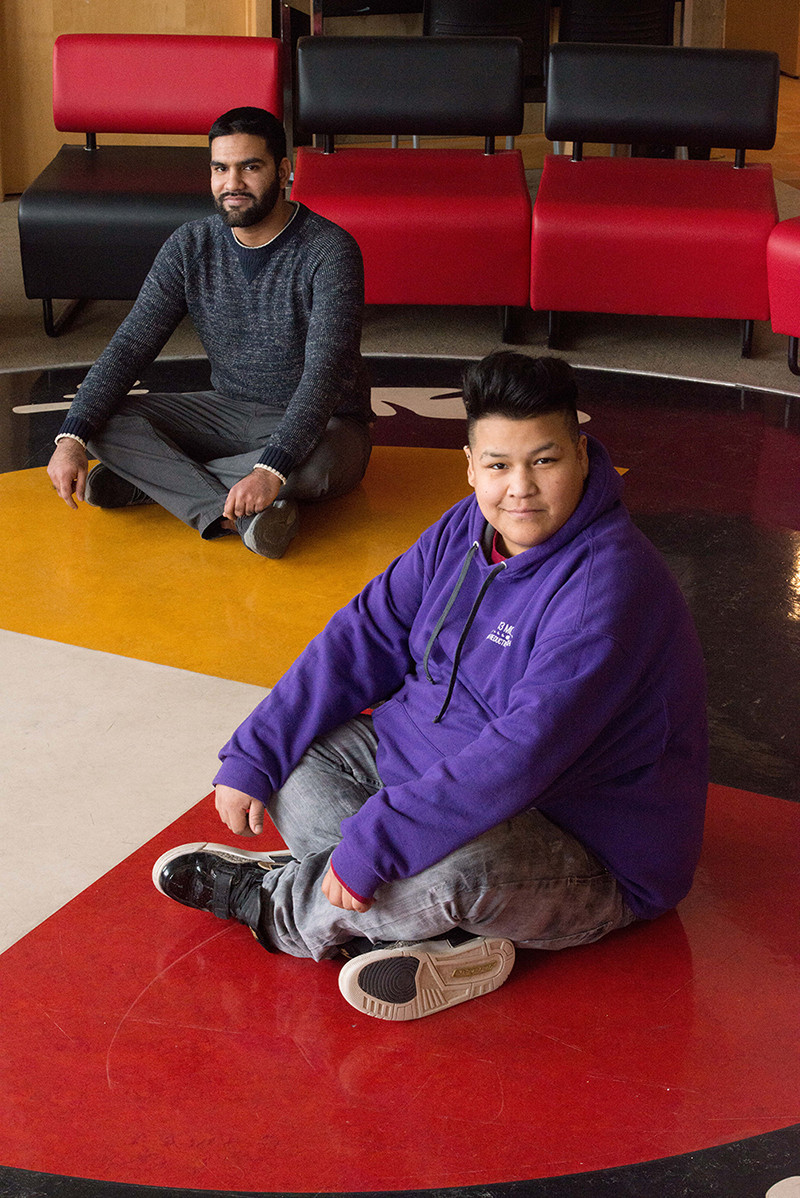A toolkit for building bridges
Report launch on Indigenous and newcomer relations
On Wednesday, Jan. 15, “Fostering Safe Spaces for Dialogue and Relationship-building between Newcomers and Indigenous Peoples” launched at Ma Mawi Wi Chi Itata Centre at 10 a.m., as hosted by Immigration Partnership Winnipeg. The report details the current relationship between newcomers and Indigenous people in Winnipeg through the organizations that respectively represent them.
Aliraza Alidina and Jenna Wirch are two of the co-authors of a new report on relations between newcomers and Indigenous peoples. // Photo by Keeley Braunstein-Black
Aliraza Alidina, one of the report’s co-authors, says the project initially started as a field placement in the Masters of Development Practice in Indigenous Development program offered by the University of Winnipeg. He did a three-month placement with Immigration Partnership Winnipeg (IPW), began doing literature reviews and developed a research framework on the area of Indigenous/newcomer relations.
“Later on, there was an opportunity with the Winnipeg Foundation, the emerging neighbours fellowship program,” he says, which provided a grant for his research. “We collaborated with Aboriginal Youth Opportunities and Jenna Wirch and Darrien Morton, who are my research partners.
“We interviewed or engaged with community workers, elders, leaders, activists from the newcomer community – mostly organizations representing or serving newcomers – and organizations, activists and community leaders for Indigenous people, as well as faith-based institutions.”
Alidina says that during this phase, the team was looking to understand what the current state of Indigenous/newcomer relations was in Winnipeg and get a sense of the challenges being faced, along with any initiatives already in place. He says they were “just kind of collecting different experiences, and we were also collecting recommendations for the development of an orientation toolkit.”
Hani Ataan Al-Ubeady, who is currently the community engagement co-ordinator for IPW, says the report and toolkit “is a very exciting step” for the organization.
“The main purpose for us in doing this work is to bridge the gap that already exists between the Indigenous community and the newcomer community,” he says.
He says that in the process of the report’s creation, while working with Indigenous partner groups, they concluded that there was an educational gap. Newcomers’ orientation programs were not always effective in orienting people to the history and context of colonization, and some were picking up stereotypes, misconceptions and myths about Indigenous people.
Al-Ubeady says they have currently worked on developing pilot toolkits addressing two of the 10 key thematic recommendations outlined by the report.
Alidina says the report covers where things currently stand between the Indigenous community and newcomer communities in Winnipeg, as well as best practices for engagement between the two groups. The toolkit covers definitions, the pre-colonial context, the colonial process and the legacy of colonization and Indigenous resurgence.
“The toolkit should not be like a booklet or a document that is final. Rather, it should be incorporated (into) a platform where it can be continuously edited using different methods ... while being centralized and accessible to all community workers,” he says. “It should be a living document that responds to new developments, new research, new events that are happening.”
Alidina says there was also effort taken to translate the report into French, “as it was requested by agencies serving francophone newcomers,” and many newcomer resources are not translated.
Published in Volume 74, Number 14 of The Uniter (January 16, 2020)






